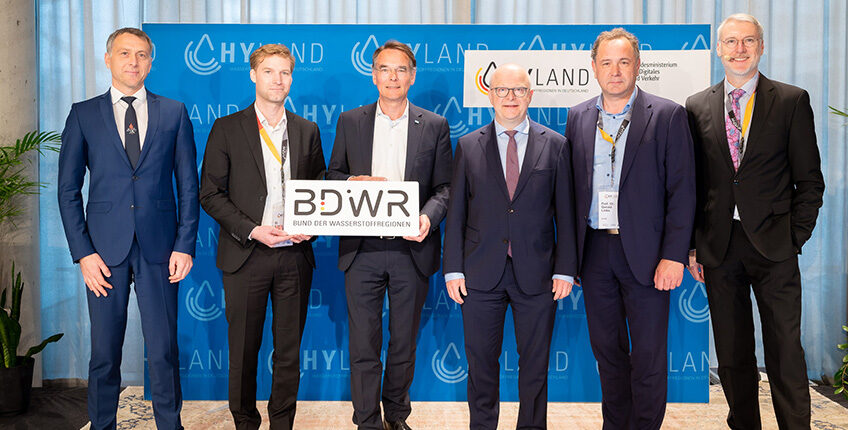The Association of Hydrogen Regions (BdWR – Bund der Wasserstoffregionen) is being established at this year’s HyLand Symposium in Berlin. The idea is based on the conclusions of the HyLand programme of the Federal Ministry for Digital and Transport (BMDV – Bundesministerium für Digitales und Verkehr) and seeks to lend a political voice to the hydrogen regions.
Regional hydrogen concepts along the entire value chain have been created and implemented within the scope of the HyLand programme since 2019. The practical experience and insights gained so far from the work in the 51 regions represent significant added value for the implementation of the National Hydrogen Strategy. Nevertheless, when designing technical-economic approaches for the regional hydrogen concepts, it became apparent that gaps between federal policy discussions and the implementers on the ground still need to be closed. The regional perspective relating to a hydrogen economy has not been sufficiently taken into consideration at the federal level to date.
With the establishment of the Association of Hydrogen Regions (BdWR – Bund der Wasserstoffregionen), this situation is now to be addressed and all regional stakeholders are to be given a combined voice at the federal policy level – in future also those operating outside of the HyLand initiative. Together with Dr. Stefan Kerth (District Administrator of Vorpommern-Rügen) as the political representative of a HyLand region, the DVGW and VKU have now announced the founding of the BdWR at the HyLand Symposium in Berlin. All HyLand regions are invited to join this initiative and jointly drive forward the importance and potential of the regional hydrogen economy with a strong collective voice. In the future, the alliance will be open to all hydrogen regions in Germany.
Kurt-Christoph von Knobelsdorff, CEO and spokesperson, NOW GmbH: “The HyLand regions have amassed extensive implementation expertise for the development of a hydrogen economy. This know-how is of great value for the further development of Germany’s hydrogen goals. With the Association of Hydrogen Regions, these regions are now being given a voice to politically convey the implementation obstacles identified there as well as the solutions developed.”
Prof. Dr. Gerald Linke, Chairman of the Board, DVGW: “Ultimately, the transformation of our energy supply system can only take place if it is also successful on the local level, with local suppliers and consumers. It is crucial that the specific requirements for adapting the infrastructure and applications to the new gases are met locally. The Association of Hydrogen Regions will play a central role in this – as a platform for the transfer of know-how, the exchange of practical experience and as a mouthpiece for politics.”
Ingbert Liebing, Managing Director, VKU: “Hydrogen is indispensable for an efficient energy and heating transition. Hydrogen can be used in many different ways and stored seasonally, provide relief for the electricity grid, and make an important contribution to system stability. The founding of the Association of Hydrogen Regions rightly emphasises the regional perspectives of a hydrogen economy. Nothing happens unless it happens locally. And that’s what we need to keep communicating at the federal level.”
Dr Stefan Kerth, District Administrator of Vorpommern-Rügen: “Within the scope of its HyPerformer application, the district has designed a regionally integrated value chain. This raises various issues, including those relating to municipal law. It is particularly important that, in addition to the commercial framework conditions, the federal and state governments give the districts and municipalities the necessary scope for action. A strong alliance can significantly strengthen municipal positions and interests.”
Regional hydrogen concepts – harnessing municipal competencies
Municipal and medium-sized enterprises are supporting pillars of the energy transition in various sectors, e.g. in municipal heating planning or in the transport sector. Hydrogen plays an essential role in this context. Consequently, regional hydrogen concepts, such as those created in the HyLand competition, are indispensable for a successful energy transition. “The BdWR is the logical consequence of the successful work within the HyLand programme and offers an ideal platform to address the complexity of regional hydrogen concepts,” says Dr. Hanno Butsch of Becker Büttner Held Consulting AG (BBHC). “Through the cooperation between the political representatives of the regions with the VKU and DVGW, the current challenges in the fields of technology, regulation, politics and business can be met with an outstanding level of expertise. What is unique about the BdWR is that the proposed solutions for regional concerns have their origins directly with the stakeholders in the regions. With the BdWR platform, the concerns of the regions become clearer at the federal level, so that the great potentials of a hydrogen economy are better taken into account.” The BBHC was commissioned to develop and organise the BdWR and officially presented it for the first time at the HyLand Symposium and called for participation.
About HyLand
“HyLand – Hydrogen Regions in Germany” is a competition of the BMDV that was launched in 2019. HyLand motivates stakeholders in all regions of Germany to initiate (HyStarter), plan (HyExperts) and implement (HyPerformer) concepts for the use of hydrogen and fuel cell technology in transport. The goal is the development of a regional hydrogen economy and regional application clusters. The integrated approach ensures that initial business models can be implemented, taking into account their application, refuelling infrastructure and hydrogen production.
Funding is provided within the scope of the National Innovation Programme Hydrogen and Fuel Cell Technology 2016 – 2026. HyLand is coordinated by NOW GmbH and implemented by the Project Management Organisation Jülich (PtJ).
Further information can be found at www.hy.land.
Image source: Franz Josef


